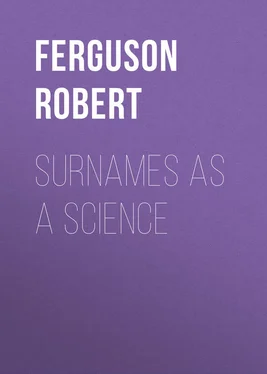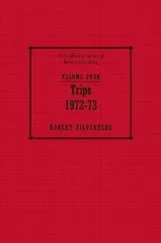Robert Ferguson - Surnames as a Science
Здесь есть возможность читать онлайн «Robert Ferguson - Surnames as a Science» — ознакомительный отрывок электронной книги совершенно бесплатно, а после прочтения отрывка купить полную версию. В некоторых случаях можно слушать аудио, скачать через торрент в формате fb2 и присутствует краткое содержание. Жанр: foreign_antique, foreign_prose, на английском языке. Описание произведения, (предисловие) а так же отзывы посетителей доступны на портале библиотеки ЛибКат.
- Название:Surnames as a Science
- Автор:
- Жанр:
- Год:неизвестен
- ISBN:нет данных
- Рейтинг книги:3 / 5. Голосов: 1
-
Избранное:Добавить в избранное
- Отзывы:
-
Ваша оценка:
- 60
- 1
- 2
- 3
- 4
- 5
Surnames as a Science: краткое содержание, описание и аннотация
Предлагаем к чтению аннотацию, описание, краткое содержание или предисловие (зависит от того, что написал сам автор книги «Surnames as a Science»). Если вы не нашли необходимую информацию о книге — напишите в комментариях, мы постараемся отыскать её.
Surnames as a Science — читать онлайн ознакомительный отрывок
Ниже представлен текст книги, разбитый по страницам. Система сохранения места последней прочитанной страницы, позволяет с удобством читать онлайн бесплатно книгу «Surnames as a Science», без необходимости каждый раз заново искать на чём Вы остановились. Поставьте закладку, и сможете в любой момент перейти на страницу, на которой закончили чтение.
Интервал:
Закладка:
Robert Ferguson
Surnames as a Science
PREFACE
That portion of our surnames which dates back to Anglo-Saxon times, and so forms a part of the general system by which Teutonic names are governed, is distinctly a branch of a science, and as such has been treated by the Germans, upon whose lines I have generally endeavoured to follow.
It has been a part of my object to show that this portion of our surnames is a very much larger one than has been generally supposed, and that it includes a very great number of names which have hitherto been otherwise accounted for, as well as of course a great number for which no explanation has been forthcoming.
Nevertheless, while claiming for my subject the dignity of a science, I am very well aware that the question as to how far I have myself succeeded in treating it scientifically is an entirely different one, and one upon which it will be for others than myself to pronounce an opinion.
This work is of the nature of a supplement to one which I published some time ago under the title of The Teutonic Name-system applied to the Family-names of France, England, and Germany (Williams and Norgate), though I have been obliged, in order to render my system intelligible, to a certain extent to go over the same ground again.
I will only say, in conclusion, that in dealing with this subject – one in which all persons may be taken to be more or less interested – I have endeavoured as much as possible to avoid technicalities and to write so as to be intelligible to the ordinary reader.
Robert Ferguson.Morton, Carlisle.
CHAPTER I.
THE ANTIQUITY AND THE UNSUSPECTED DIGNITY OF SOME OF OUR COMMON NAMES
As some things that seem common, and even ignoble, to the naked eye, lose their meanness under the revelations of the microscope, so, many of our surnames that seem common and even vulgar at first sight, will be found, when their origin is adequately investigated, to be of high antiquity, and of unsuspected dignity. Clodd , for instance, might seem to be of boorish origin, and Clout to have been a dealer in old rags. But I claim for them that they are twin brothers, and etymologically the descendants of a Frankish king. Napp is not a name of distinguished sound, yet it is one that can take us back to that far-off time ere yet the history of England had begun, when, among the little kinglets on the old Saxon shore, "Hnaf ruled the Hôcings." 1 1 From the old Saxon fragment called the "Traveller's Song." Hnaf is no doubt from the Ang. – Sax. cnafa , cnapa , son, boy, the Anglo-Saxons often representing c by a (no doubt aspirated) h .
Moll , Betty , Nanny , and Pegg sound rather ignoble as the names of men, yet there is nothing of womanliness in their warlike origin. Bill seems an honest though hardly a distinguished name, unless he can claim kinship with Billing, the "noble progenitor of the royal house of Saxony." Now Billing, thus described by Kemble, is a patronymic, "son of Bill or Billa," and I claim for our Bill (as a surname) the right, as elsewhere stated, to be considered as the progenitor. Among the very shortest names in all the directory are Ewe , Yea , and Yeo , yet theirs also is a pedigree that can take us back beyond Anglo-Saxon times. Names of a most disreputable appearance are Swearing and Gambling , yet both, when properly inquired into, turn out to be the very synonyms of respectability. Winfarthing again would seem to be derived from the most petty gambling, unless he can be rehabilitated as an Anglo-Saxon Winfrithing (patronymic of Winfrith.) A more unpleasant name than Gumboil ( Lower ) it would not be easy to find, and yet it represents, debased though be its form, a name borne by many a Frankish warrior, and by a Burgundian king fourteen centuries ago. Its proper form would be Gumbald (Frankish for Gundbald), and it signifies "bold in war." Another name which wofully belies its origin is Tremble , for, of the two words of which it is composed, one signifies steadfast or firm, and the other signifies valiant or bold. Its proper form is Trumbald, and the first step of its descent is Trumbull . A name which excites anything but agreeable associations is Earwig . Yet it is at any rate a name that goes back to Anglo-Saxon times, there being an Earwig, no doubt a man of some consideration, a witness to a charter ( Thorpe , p. 333). And the animal which it represents is not the insect of insidious repute, but the sturdy boar so much honoured by our Teuton forefathers, ear being, as elsewhere noted, a contraction of evor , boar, so that Earwig is the "boar of battle." Of more humiliating seeming than even Earwig is Flea (vouched for by Lower as an English surname). And yet it is at all events a name of old descent, for Flea – I do not intend it in any equivocal sense, for the stem is found in Kemble's list of early settlers – came in with the Saxons. And though it has nothing to do with English "flea," yet it is no doubt from the same root, and expresses the same characteristic of agility so marvellously developed in the insect.
Even Bugg , if he had seen his name under this metaphorical microscope, might have felt himself absolved from changing it into Howard, for Bugg is at least as ancient, and etymologically quite as respectable. It is a name of which great and honourable men of old were not ashamed; there was, for instance, a Buga, minister to Edward of Wessex, who signs his name to many a charter. And there was also an Anglo-Saxon queen, Hrothwaru, who was also called Bucge, which I have elsewhere given reasons for supposing to have been her original name. There are moreover to be found, deduced from place-names, two Anglo-Saxons named respectively Buga and Bugga, owners of land, and therefore respectable. In Germany we find Bugo, Bugga, and Bucge, as ancient names of men and women in the Altdeutsches Namenbuch . And Bugge is at present a name both among the Germans and the Scandinavians, being, among others, that of a distinguished professor at Christiania. As to its origin, all that we can predicate with anything like confidence is that it is derived from a word signifying to bend, and of the various senses thus derived, that of ring or bracelet (O.N. baugr ) seems to me the most appropriate. The bracelet was of old an honourable distinction, and the prince, as the fountain of honour, was the "bracelet-giver." 2 2 Stark also adduces an instance in the eleventh century of Buggo as a contraction of Burchard.
My object then at present is to show that many of our short and unpretending names are among the most ancient that we have, being such as our Saxon forefathers brought with them when they first set foot upon our shores, and such as we find whenever history gives us a yet earlier glimpse of the Teuton in his home. Bass , for instance, whose red pyramid to-day stamps authenticity on many a bottle, was in ancient times a well-known potter's name on the beautiful red Samian ware of the Romans. The seat of this manufacture was on the banks of the Rhine, and in the long list of potters' names, mostly of course Roman, there are not a few that are those of Germans or of Gauls. And there is one interesting case, that of a lamp found along the line of the Roman wall, in which the German potter, one Fus, has asserted his own nationality by stamping his ware with the print of a naked human foot, within which is inscribed his name, thus proving, by the play upon his name, that fus meant "foot" in the language which he spoke. Little perhaps the old potter thought, as he chuckled over his conceit, that when fifteen centuries had passed away, his trade-mark would remain to attest his nationality.
Читать дальшеИнтервал:
Закладка:
Похожие книги на «Surnames as a Science»
Представляем Вашему вниманию похожие книги на «Surnames as a Science» списком для выбора. Мы отобрали схожую по названию и смыслу литературу в надежде предоставить читателям больше вариантов отыскать новые, интересные, ещё непрочитанные произведения.
Обсуждение, отзывы о книге «Surnames as a Science» и просто собственные мнения читателей. Оставьте ваши комментарии, напишите, что Вы думаете о произведении, его смысле или главных героях. Укажите что конкретно понравилось, а что нет, и почему Вы так считаете.












